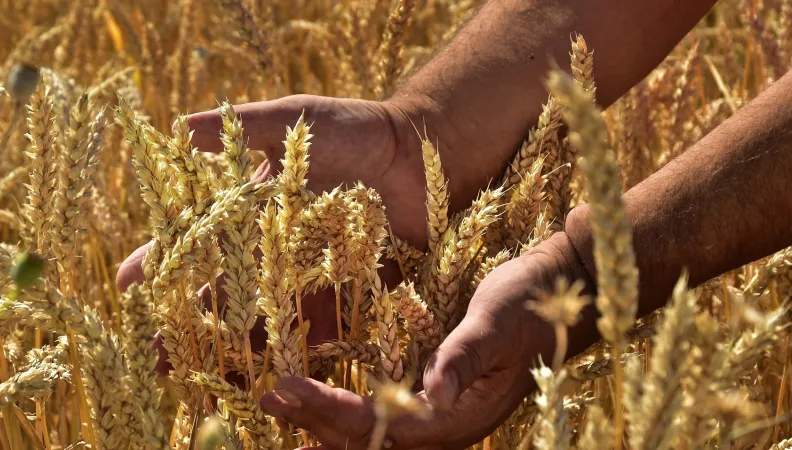Share the page
How Seed Co Group is tackling climate change in Zimbabwe
Published on
Samson Ruwisi Treasury Groupe Seed Co


Private Sector & Development #38 - Climate change adaptation: how the private sector is scaling up
To mark COP27 held in November 2022, the 38th issue of Private Sector & Development magazine is dedicated to climate change adaptation and presents the drivers for action of Development Finance Institutions and the private sector faced with the challenges of the climate crisis.
Farmers in Southern Africa are grappling with the hazards of climate change and reduced rainfall. Seed Co Group – a company based in Zimbabwe – is attempting to provide them with solutions by developing hardier seeds that can thrive in these changed conditions. Stepping up R&D investment and effort is a crucial part of the process and the results in terms of resilience can deliver multiple benefits to farmers.
What consequences has climate change had on your customer's activity?
In recent years, we have witnessed significant changes to weather patterns. The following are just some of the negative effects of climate change that have affected our farmers. A general shift in rainfall patterns has resulted in prolonged sun drying of seeds on grower farms, which has resulted in increased diseases such as cob rot. For instance, between 2013 and 2018, some of our growers lost a significant tonnage to maize cob rot. Our growers have experienced erratic rains and long mid-season dry spells in recent times which has significantly affected farmer’s yields. Furthermore, and due to unpredictable weather conditions, our growers have experienced increased production costs of seed which is compounded by the manual on-farm processing and handling of seed.
What measures have you taken to deal with the climate risks?
In trying to assist our farmers, we have taken the following measures. We recently commissioned The Seed Co Drier Project in 2021 which was financed by Proparco to the tune of USD 12.5 Million. Our Research & Development [R & D] team continues to release climate smart seed varieties every 2 years across all main crop types in our basket offering. These are hybrid corn varieties adapted to the climates in the regions where we operate.
How is Seed Co Group helping to reduce farmers' vulnerability to climate change?
We are also trying to diversify and in the process encourage our farmers to progressively grow small grain crops like pearl millet, sorghum, sunflower and upland rice. These crops are hardy and generally do well in semi-arid conditions. The commissioning of the drier project has helped farmers with early seed delivery and seed processing. This involves assisting farmers on reduced processing days and potential double cropping due to early harvests. General product quality has also improved as early deliveries enable Seed Co to handle quality issues at Seed Co handling facilities.
How will the construction of a maize dryer - financed thanks to a Proparco loan - increase production capacity and double farmers' harvests?
We have obtained a 7-year project finance facility from Proparco worth USD 12.5 Million. To our growers, sun dried seed takes 60 days to get to a recommended moisture content of 12.5%, whilst artificially dried seed takes just 4 days [moisture content down to 12,5% from 35%], meaning farmers can harvest and deliver early quality seeds. The installation of a corn drying unit will allow farmers, who currently dry their corn in the sun, to harvest their ear corn earlier in the year and give it to Seed Co to dry. This will considerably reduce losses related to climate hazards. Early seed deliveries equally mean early payments to growers, which will enable growers to have disposable incomes for other agricultural activities, i.e., early purchase of agriculture inputs. To the company, earlier processing of seed will enable the company to avail seed to the distribution channel early; in other words, seed is placed in the channels as early as March/April depending on seed variety. Lastly, the Seed Maize Conditioning Plant uses the very latest seed drying technology comparable to best international world standards.
Seed Co Group is the largest african Seed company. How are its Seed R&D research programs better adapted to new climate conditions?
We continue to invest in R & D and our Group CEO has committed to investing about 10% of turnover on research & development. Examples of the benefits of this commitment include a new world class lab in Zimbabwe, and increased investments at our Zambia research station, which has culminated in the release of new long-season varieties. We collaborate in our R & D activities very closely with the R & D teams of our main share-holder, Groupe Limagrain – one of the largest seed companies worldwide – to continuously work on new varieties that are better suited to new climatic conditions, whilst benchmarking our activities in line with world class standards. To cater for different market segments, our R & D division continues to work on releasing late maturing maize seed varieties that do not suffer the effects of mid-season droughts. They enter a vegetative state in drought conditions and derive optimal benefit from late season rains. Furthermore, the main focus of our R & D is to release early maturing maize seed varieties that mature within short rain seasons.
In 2021, €68 million of adaptation co-benefits were recorded for the projects allocated by Proparco
In 2021, Proparco allocated 30 projects with climate co-benefits, with a total of €677 million of co-benefits. Six of these projects contribute to climate change adaptation, amounting to €68 million of adaptation co-benefits. This is more than double the volume of financing for climate change adaptation approved by Proparco in 2020 (€30 million).
Financial commitments scaled up
- 2019: €21 M
- 2020: €30 M
- 2021: €68 M
Author(s)
Samson Ruwisi
Treasury
Groupe Seed Co

